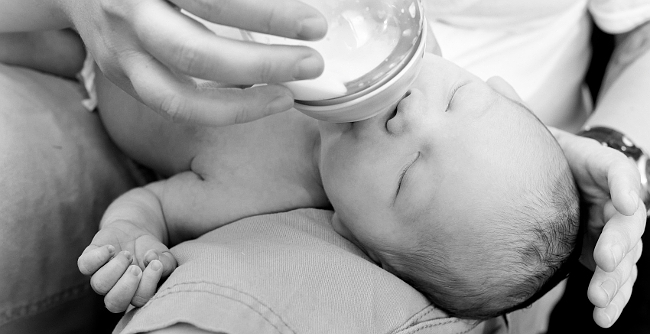We look at the argument for breast-feeding versus using a bottle and explain how dads can play a key role in helping their partners choose the ideal option for both mother and baby.
With the much anticipated arrival of your new baby looming, you and your partner need to be prepared to debate plenty of issues and make lots of decisions. Views on parenting methods vary enormously and are passionately held – so be prepared for a lively discussion from time to time. However, whilst compromise can be made on most issues there is one very important aspect to agree on; how you’ll feed your baby – breast or bottle?
The contenders
This debate has raged for decades, with both sides defending their corner with equal vigour. There is no precise right or wrong answer but there are certainly advantages and disadvantages to both methods of feeding (and in fact, to ‘mixed’ feeding).
One way to distinguish the two could be convenience. On one hand, women who bottle-feed can leave their babies with others while they catch up on sleep or take a well-deserved break – and there will certainly be no need for a last minute dash to the shop. Formula milk is also more difficult to digest, meaning a bottle-fed baby will tend to sleep longer.
On the other hand, if your baby is breast-fed there’s no need to get up in the night to sterilise bottles, breast-milk is always at the right temperature and you don’t have to cart around huge bags of equipment when you leave the house. And of course, breast-milk is free!
Simply the breast
We are constantly being bombarded with the message that ‘breast is best’ – but what does this really mean? Most people will probably know that breast-milk contains antibodies that help to protect against a wide range of infections, but they may not know that this living fluid also contains active cells that mop up bacteria and viruses. Some studies such as Project Viva, a long-term investigation of pregnancy and child health in the US, have also shown that breast-feeding may positively affect a baby’s brain development and IQ, as well as contributing to optimal oral development and a decreased risk of tooth decay.
Beneficial for mum
The benefits do not stop with the baby – women who breast-feed may experience less postnatal anxiety and depression because breast-feeding triggers and releases oxytocin that can help them relax. Breast-feeding can also help mobilise fat stores and burn up to 500 calories a day, to help with post-birth weight loss (a bottle-feeding mum would need to swim 30 laps or ride a bicycle for more than an hour to achieve this!). For women with babies under six months old, exclusive and frequent breast-feeding can be a natural (although not 100% reliable) form of contraception. A number of studies, including one published by researchers at the University of Pittsburgh, have also shown that breast-feeding can lower the risk of breast cancer, diabetes, high blood-pressure and even cardiovascular disease.
If the price is right
Then there is that cost implication – even if a baby is drinking expressed breast milk and you need to buy feeding accessories, you will still save money. The average bottle-feeding mother will spend around £1,700 a year on formula milk and equipment. And if your duties include changing, babies who are breast-fed have much less smelly nappies…
Making a connection
The emotional benefits of breast-feeding must not be down-played. For many mums, the experience of providing nourishment for their baby can be incredibly special, creating an early bond which is strengthened through regular contact. The confidence of new mums may also sky-rocket with the belief that they can fully care for their baby.
Although some mums do still feel guilty about using a bottle, thinking they are missing out on hallmark ‘mother-baby’ moments, it is the time spent connecting that really counts regardless of the method. Whilst breast-feeding can in some ways make men feel a little surplus-to-requirements, let’s not forget that bottle-feeding gives Dad the opportunity to get right into the thick of it, which can also enhance the father-child relationship from an early age.
A happy medium
Another option is to express breast-milk – which still offers the nutritional benefits but is perfect for mums who are on the move or ready to head back to work. Using a pump to fill sterilised bottles ahead of time, which can be stored in the fridge for up to four days or up to six months in the freezer, means that Dads can have their moment in the feeding spotlight.
Choosing the right pump can be a tricky decision – with both manual and electric options available. Although some women still feel more comfortable stimulating milk with their hand, electric breast-pumps make things a whole lot faster and easier.
However, picking the perfect pump for you depends on how much dedicated time you have each day and how often you plan on producing milk. If your days are frantic with work and looming deadlines, a powerful automatic pump will be the logical choice – a good one only taking around 15 minutes to pump both breasts. If you have a far more relaxed set-up or you only need to pump occasionally, a manual option may be the ideal way to go.
Using a fully automatic pump might be a strange sensation for the first few times, but this should eventually become more natural. Another useful investment could also be a hands-free pumping bra, which leaves your hands available to read the latest novel, shop online, get paper-work finished or even talk to friends on the phone.
The most important aspect of using a breast-pump – be that electric or manual – is that you feel completely relaxed whilst using it; this leads to higher production and helps manage any letdown.
How can Dads help?
Breast-feeding is a new skill to learn, and your partner will need plenty of encouragement and reassurance. Breast-feeding, even for the first few days, will provide your baby with colostrums (first milk), which is low in fat, high in carbohydrates, protein and antibodies and extremely easy to digest. In addition, it has a wealth of vitamins and minerals that a baby needs, making it the ‘perfect’ nutritional choice.
Nine out of ten women who give up breast-feeding during the first six weeks stop before they want to. Often the cause is lack of support and information, and the attitude of fathers plays a major role too. Although one often hears women say they ‘couldn’t’ breast-feed, you may be surprised to learn that fewer than 3% of women are physically unable to do so.
Another common misconception is ‘latch-on’ pain, which can actually last from a week up to 10 days and making sure your partner doesn’t become discouraged is essential. Although you can’t physically participate, there’s nothing to stop you picking up the guide on the best techniques or if she’s using a pump, learning about the technology. You can play an integral role in feeding your child, even if that means just being there when her confidence falters to say ‘let’s give that one more go?’
For most, the decision of whether to pick breast over bottle can come down to a variety of factors including medical considerations, level of comfort and even the lifestyle you want to lead. Although studies may throw us in one direction and our friends in another, the ultimate choice to be made is which method allows you both to feel most comfortable in your role as parents.




























